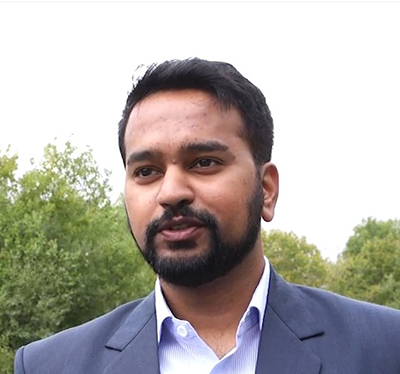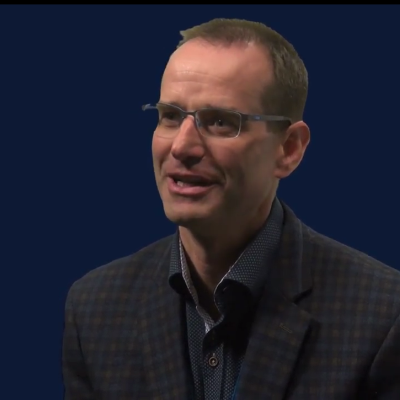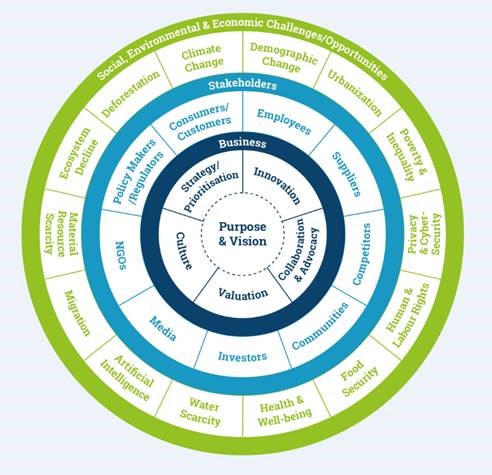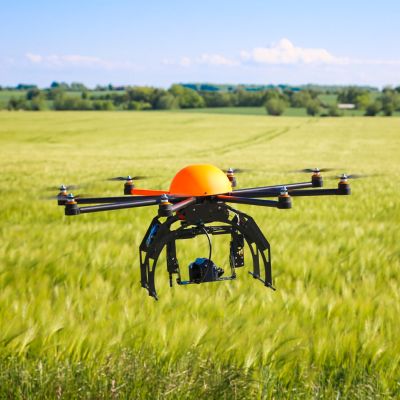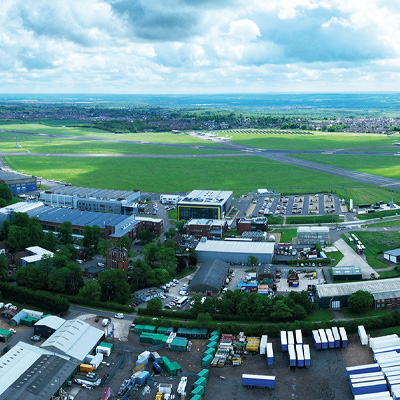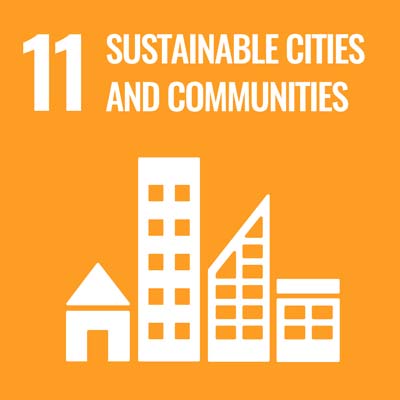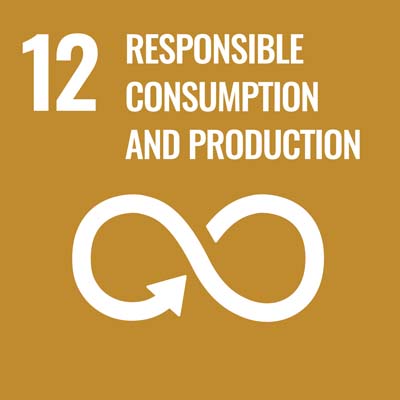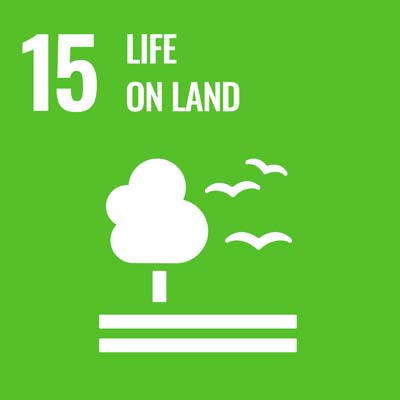Ways to meet us
Study for a successful and impactful environmental management career
Meeting the challenge of sustainable business, which strives to balance environmental, social and economic risks and opportunities, requires innovative knowledge, skills and tools. This MSc will equip you with advanced theoretical knowledge and help you to develop practical and professional skills to positively address sustainability issues in the real world. You will critically evaluate complex environmental issues, develop effective strategies and lead their implementation to enable an effective and sustainable future. This unique MSc integrates business acumen from our globally renowned Cranfield School of Management, as well as environmental expertise from our leading environment academic team, to prepare you for a successful career in sustainable and environmental management.Overview
- Start dateFull-time: October, part-time: October
- DurationOne year full-time, two-three years part-time
- DeliveryTaught modules 80 credits/800 hours, Group projects 40 credits/400 hours, Individual project 60 credits/600 hours
- QualificationMSc, PgDip, PgCert
- Study typeFull-time / Part-time
- CampusCranfield campus
Who is it for?
The Environmental Management for Business course is open to students from a range of academic backgrounds, including science and engineering, business and social sciences, who wish to develop a successful and rewarding career in environmental management. Specifically designed to meet the demands of global employers, it will equip you with current thinking on environmental issues, the ability to develop effective environmental management strategies, and the leadership skills you will need to bring your ideas to life.
Your career
With the urgent global focus on environmental issues and natural resource management, you can expect to be highly sought after by employers. Successful students develop diverse and rewarding careers in environmental and business consultancies, manufacturing and service industries, public sector organisations such as environmental protection agencies, together with non-governmental organisations.
Adam Faiers, alumnus and Director of Spedan Ltd, shares his experiences of Cranfield
Graduates of this course have gone onto work in a range of roles, including:
Corporate Sustainability Manager, Senior Sustainability Consultant, Head of Environmental Operations, Business/Research Consultant, Sustainability Project Manager, Environment Health & Safety Officer, HSEQ-coordinator, Product Stewardship Engineer, Research Engineer, Risk Analyst, National Project Coordinator.
Within prestigious institutions including:
ASE Group, AVISO Consultancy, Bouygues Construction, Caterpillar, Confederation of European Paper Industries, Continental Landscapes Limited, Coriolis Energy, ENTPE (France), Flag , Groupe de Bruges, Honeywell, HSSMI, Imerys, Interserve, JLL, KierWSP, KPMG, Manhattan Atrium, Müller UK & Ireland Group , Oakdene Hollins Ltd, PwC, Samsung Electronics, Save-by-Solar Sweden AB, Unilever, United Nations Development Programme, University College London, Verascio Ltd, Virgin Media, VR Group (Finland), Yorkshire Water.
This course is focused on preparing you to follow in the footsteps of our alumni and forging a successful career. Teaching is delivered by research active staff, together with visiting lecturers and environmental management specialists, to ensure that you learn the latest theory and practice. You will apply your theoretical understanding through practical sessions, industrially relevant group and individual research projects.
Cranfield Careers and Employability Service
Cranfield’s Career Service is dedicated to helping you meet your career aspirations. You will have access to career coaching and advice, CV development, interview practice, access to hundreds of available jobs via our Symplicity platform and opportunities to meet recruiting employers at our careers fairs. Our strong reputation and links with potential employers provide you with outstanding opportunities to secure interesting jobs and develop successful careers. Support continues after graduation and as a Cranfield alumnus, you have free life-long access to a range of career resources to help you continue your education and enhance your career.
Why this course?
The Environmental Management for Business masters provides you with the knowledge and skills demanded by the full range of organisations involved in all aspects of managing the natural environment.
Merge environmental management expertise with sustainable business practices, enhanced leadership and management skills, innovation and entrepreneurship while addressing global sustainability challenges.
- Develop an advanced understanding of sustainable development and the knowledge of related international, national and local government policies and frameworks, with particular emphasis on natural resources and the environment.
- Study at a university that has been providing postgraduate education in environmental management for over 20 years.
- Gain advanced leadership skills via the Leading Corporate Sustainability module, delivered in association with the globally-renowned Cranfield School of Management.
- Benefit from teaching by research-active staff and industry specialists that were rated ‘excellent’ in the last Teaching Quality Assessment
- Develop practical skills that will enable you to make an immediate impact on real-world environmental issues from day one in your new career.
- Leverage our global reputation, alumni and extensive links with relevant employers to develop your career.
- Enhance your CV with complimentary membership of the Chartered Institution of Water and Environmental Management (CIWEM) and the Institute of Sustainability and Management Professionals (ISEP formerly IEMA).
The Environmental Management for Business MSc course is exceptionally well tailored for environmental sustainability. It covers all the key areas you need to understand, helping you develop strong critical thinking skills and the ability to analyse environmental problems and design effective solutions. It is a highly versatile programme, and the assessments allow you to fully absorb and apply the content from each module.The group project, individual dissertation, and final research thesis provide valuable exposure to professional academic writing while allowing you to gain a deeper and broader understanding of your chosen subject area.
I chose Cranfield because it's a very versatile course, it gives you a lot of background in environment and sustainability in a very broad sense. Cranfield has helped me step out of my comfort zone and push myself towards being a better version of myself. The intensive year really helped me a lot. It was a great experience.
There are students that are coming up with ideas that I would never have thought of and I know that businesses who we collaborate with would never have thought of. So it’s really important to get idea generation, to get motivations and to get people engaged in what businesses need today.
My Cranfield degree was known among professionals in my company, and recognised as a quality degree. It complemented my engineering knowledge with a more strategic and business-oriented point of view; I use this knowledge every day.
Informed by industry
The Environmental Management for Business MSc is closely aligned with industry to ensure that you are fully prepared for your new career.
- The teaching team are heavily involved in industrially funded research and development, enabling you to benefit from real-world case studies throughout the course. Cranfield University are currently collaborating with the United Nations Economic Commission for Europe (UNECE) Environment Division to integrate foresight methodologies in the work of the Committee on Environmental Policy (CEP), which supports member-states to enhance their environmental governance. Learn more: Shaping environmental policy in the pan-European region applying foresight methodologies.
- You will have the opportunity to participate in application focused and industrially relevant individual and group projects focused on your personal interests and career aspirations.
- Accreditation by the Chartered Institution of Water and Environmental Management (CIWEM) and the Institute of Sustainability and Management Professionals (ISEP formerly IEMA) ensures that the course meets current professional standards.
- Our regular consultations with senior representatives of key industries ensures that the programme continues to reflect the changing needs of employers. These organisations include:
|
|
Course details
This course comprises eight modules, an individual project and a group project.
Part-time students normally complete individual dissertations in place of the group project.
The taught programme comprises a structured sequence of modules, each containing a series of lectures and other classroom-based teaching, supplemented by practical work. The taught modules are assessed by assignments. Modules are taught during one week of structured teaching, followed by one week of independent learning on the module assignment.
MSc course structure:
Course delivery
Taught modules 80 credits/800 hours, Group projects 40 credits/400 hours, Individual project 60 credits/600 hours
Group project
Group projects, which run between February and April, enable you to apply the knowledge, understanding and skills you have developed during the course modules into a real-world situations, while gaining transferable skills in project management, time management and written and oral communication.
Group projects are usually sponsored by industrial or public sector partners who provide particular challenges linked to their businesses. Projects generally require the group to provide a solution to the operational challenge. Potential future employers value this experience.
The group projects span the MSc courses across the Environment programme, giving the added benefit of gaining new insights, ways of thinking, experience and skills from students with other backgrounds.
During the project you will develop a range of skills including learning how to establish team member roles and responsibilities, project management, and delivering technical presentations. At the end of the project, all groups submit a written report and deliver a presentation to the industrial partner. This presentation provides the opportunity to develop interpersonal and presentation skills within a professional environment. The project is assessed through a written report and an oral presentation by the group. In addition, a poster exhibition provides the opportunity to further develop presentation skills and effectively handle questions about complex issues in a professional manner.
Part-time students write a review of available information around a relevant topic including academic literature, presentation of ideas and analysis and the development of conclusions.
Recent group projects include:
- Development of a sustainable food production system based on Forest Garden concept in Stratford-upon-Avon (Forest of Hearts - Edible Gardens for Good)
- Environmental, technical, socio-economic assessment of retrofitting external insulation on older university buildings (Cranfield University)
- Food waste innovations: case study of small to medium sized businesses (IMAGE programme –European Regional Development Fund)
- A natural capital-based approach to infrastructure site selection as applied to transport routes and housing developments (Bedfordshire Local Nature Partnership)
- Scenario planning for a circular future: Peterborough context (Opportunity Peterborough)
- Assessing the environmental, technological and economic feasibility of potential reuse of tea waste (Unilever)
- Data visualisation approaches in supporting 10-year investment planning decisions in East Anglian flood and coastal management (Anglian Water)
- Development of full life cycle costs at National Grid for the UK gas distribution (National Grid).
Individual project
- Provide the ability to think and work in an original way
- Develop and test your ability to plan and carry out a piece of research
- Apply theoretical knowledge and critical thinking
- Contribute to knowledge
- Overcome genuine problems
- Communicate through a thesis and oral exam
As our academic research is so closely related to industry and public sector organisations, it is very common for our partners to put forward real-world problems or areas of development as potential research topics.
For part-time students, it is common that their research projects are undertaken in collaboration with their place of work under academic supervision, given the approval of the Course Directors.
Recent individual projects:
- Developing a bespoke toolkit to analyse and communicate the environmental benefits of cardboard recycling (for a waste solutions company)
- An economic valuation of the Thames Path National Trail
- Developing supply chain sustainability in the construction industry through a knowledge sharing and benchmarking platform
- An exploration of the relationship between small businesses and their resilience to extreme weather-related disruptions
- Carbon footprint analysis of an integrated waste recovery plant
- Sustainability key performance indicators for a media business
- Smart homes, grids and cities: solutions for overpopulated cities with internet of things and smart systems integration
- Plausible future scenarios for the manufacture and consumption of convenience foods in urban India to 2030
- Circular economy: potential for resilience or vulnerability? – A Malaysian case study
- How can the fast-moving consumer goods sector help create a market for waste treatment by-products?
- An environmental evaluation of urban mobility based on an LCA approach
- Managing the adoption of circular economy in SME
- Exploring social media and networks as a driver to promote sustainable behaviour: case analysis and policy implications
- Evaluation of methods for sustainability assessments of new, emerging and/or renewable energy technologies
- Exploration of WEEE regulations and the potential for additive manufacturing materials.
Modules
Keeping our courses up-to-date and current requires constant innovation and change. The modules we offer reflect the needs of business and industry and the research interests of our staff and, as a result, may change or be withdrawn due to research developments, legislation changes or for a variety of other reasons. Changes may also be designed to improve the student learning experience or to respond to feedback from students, external examiners, accreditation bodies and industrial advisory panels.
To give you a taster, we have listed the compulsory and elective (where applicable) modules which are currently affiliated with this course. All modules are indicative only, and may be subject to change for your year of entry.
Course modules
Compulsory modules
All the modules in the following list need to be taken as part of this course.
Principles of Sustainability
| Module Leader |
|
|---|---|
| Aim |
Human population growth and increased resource use per capita requires improved management of our global ecosystem. Approaches such as the “Sustainable Development Goals”, “Natural Capital”, “Ecosystem Services”, and “Planetary Boundaries” provide frameworks for businesses and wider society to resolve the synergies and trade-offs between major economic, environmental and social challenges. The “Circular Economy” approach refers to the development of “restorative” industrial systems that are grounded on the lessons of non-linear, feedback-rich ecosystems. The third approach is to explore the nexus between renewable energy, food, and other ecosystem services using per capita energy and food consumption. This module introduces and critiques the above frameworks and examines their application to resolve real-world problems and create commercial opportunities. |
| Syllabus |
|
| Intended learning outcomes |
On successful completion of this module you should be able to:
|
Leading Corporate Sustainability
| Module Leader |
|
|---|---|
| Aim |
Global sustainability challenges are shaping the way business operates in the 21st century. Businesses are under increasing pressure from multiple stakeholders (for e.g. shareholders, customers, employees, society) to manage their positive and negative impacts with clear responsibility and strategic intent. Leading firms are choosing to respond to these challenges by generating sustainable value propositions to ultimately drive competitive advantage. For many this has meant re-engaging at the level of purpose and re-addressing their role in wider society and for human well-being. This module outlines the major sustainability challenges and explores the capabilities organisations require to respond positively to them. It will engage you in gaining a better understanding of how corporate action can be best configured to promote responsible and sustainable business strategies. In doing so, it will demand management students (as future business managers and leaders) to reflect on the long-standing debate about whether or not ‘the business of business, is still business? This module is 10 credits. Watch video: An introduction to the Leading Corporate Sustainability module |
| Syllabus |
The content is organised around the sustainability management ‘compass’ below: The course content is structured as follows: Part 1: Setting the context Context setting The role of business Exploring possible futures Part 2: Developing the capabilities |
| Intended learning outcomes |
On successful completion of this module you should be able to:
|
Economic Valuation and Appraisal
| Module Leader |
|
|---|---|
| Aim |
Environmental accounting is being used by institutions and businesses to guide decision making regarding competing projects and programmes. It involves financial appraisal, environmental valuation, and economic appraisal (or social cost-benefit analysis). This module explores the economic concepts and techniques that can be used for the valuation of non-market social and environmental services. You will also gain practical experience in extending a financial analysis to allow an economic appraisal. |
| Syllabus |
|
| Intended learning outcomes |
On successful completion of this module you should be able to:
|
Sustainability and Environmental Assessment
| Module Leader |
|
|---|---|
| Aim |
Environmental impact assessment and life cycle analysis are important tools for evaluating the sustainability of complex renewable energy technologies and industrial processes or products. The tools and concepts taught in this module will enable you to assess the sustainability of a case study from an environmental standpoint. Analysis of relevant case studies to demonstrate the assessment process, including how to account for uncertainty and sensitivity analysis. |
| Syllabus |
Environmental Impact Assessment, |
| Intended learning outcomes |
On successful completion of this module you should be able to:
|
Environmental Policy and Risk Governance
| Module Leader |
|
|---|---|
| Aim |
A critical application of environmental risk management is in the development and appraisal of policy in central government and business. Policies are developed to manage environmental risks and selection of policy options must be informed by risk based tools and techniques. Doing so demands a comprehension of the technical, organisational and human elements of governing environmental risks and developing environmental policy. This module draws these themes together by introducing core concepts and then illustrating these concepts with case studies spanning business and government, and finally application via a group exercise. Core lectures are supported by multiple case studies, a workshop and module assignment.
|
| Syllabus |
|
| Intended learning outcomes |
On successful completion of this module you should be able to:
|
Decision Science
| Module Leader |
|
|---|---|
| Aim |
The module introduces the context of environmental decision making, providing both a conceptual overview and practical tools for addressing environmental management problems. It aims to promote an understanding of weight-of-evidence approaches used to inform real-world problems by research, industry, and government. Central to this is an understanding of the strengths and limitations of different approaches and aspects of decision science, the social, economic, and environmental trade-offs made during decision-making, and how real-world complexity and future uncertainty is accounted for. Students will learn how to apply systems thinking to evaluate different courses of action in response to environmental challenges related to land, water, and/or energy. |
| Syllabus |
|
| Intended learning outcomes |
On successful completion of this module you should be able to:
|
Elective modules
One of the modules from the following list needs to be taken as part of this course.
Strategic Foresight
| Module Leader |
|
|---|---|
| Aim |
Strategic foresight research refers to a range of methods that can be used to identify, analyse and communicate insights about the future. Standard methods include horizon scanning, trend research, and scenario planning. Outputs include emerging issues, trends, visions, scenarios, and wild cards. The methods employed and insights produced are used by both private and public sector organisations to inform a wide range of policy, risk, strategy and innovation processes. Foresight research is a truly inter-disciplinary ‘science’, covering and combining developments in society, technology, economy, ecology, politics, legislation and values. Crucially, foresight research is as much about analysing the past and present, as it is about looking to the future. Once we understand how a system has developed and works today, we can explore how it may evolve and what it may look like in the future. Strategic foresight techniques consider a wide range of possible, plausible futures so that planning can be put in place to adapt to and mitigate against various conditions. It is designed to add resilience, adaptability and flexibility to organisations in an increasingly complex and fast changing world. This module will explore how: Other foresight methodologies (e.g. scenario planning, visioning, back-casting) can be used to help us to use the trends identified from horizon scanning to identify how the future might develop. |
| Syllabus |
In this module, you will adopt a bespoke three-step foresight process to interpret change in the external organisational environment and use the insights generated to anticipate plausible futures and stress-test strategies that support building organisational resilience. The foresight process will support you in building: Robust organisational intelligence through systematic horizon scanning and insight generation. Resilience through comprehensive exploration and interpretation of the future to maintain flexibility (ability to adapt) against impending risks and to cease opportunities. Step 1: Build organisational intelligence. A 360o horizon scan of the external environment, both operational (e.g. market and consumer trends, competition) and contextual (e.g. regulatory constraints and opportunities, technological and social change), to systemically analyse those trends and patterns within the industry/sector and beyond that point to persistent trends, discontinuities or sharp disruptions that may challenge the future direction and ambition of your organisation. Step 2: Develop a set of alternative plausible future scenarios. Build a set of plausible scenarios that explore alternative development pathways for your organisation in the future. The scenarios will reflect both positive and negative factors influencing the development of the organisation over the short to long-term, considering the contrasting role that various external driver of change (e.g. socio-demographic, technological, economic and policy change) will play. The scenarios should also consider discontinuities or sharp disruptive events (e.g. fuel crisis, political conflict or war) that may challenge the organisation’s continuity and its resilience, requiring an analysis of risks, opportunities and trade-offs over the long-term. Step 3: Create a vision and strategic roadmap for achieving a desirable future (scenario). Develop a vision and strategic roadmap for achieving the utopian scenario (i.e. most desirable future), defining the pathway and options for achieving the ambitions of your organisation. Apply the scenarios to stress-test the organisation’s future vision / strategy against potential disruption and to better prepare for other impending risks (e.g. financial and regulatory constraints) but also ceasing the opportunities that may arise. |
| Intended learning outcomes |
On successful completion of this module you should be able to:
|
Energy Entrepreneurship
| Module Leader |
|
|---|---|
| Aim |
In this world of downsizing, restructuring and technological change, notions of traditional careers and ways of creating value have all been challenged. People are depending more upon their own initiative to realise success. Never, it seems, have more people been starting their own companies than now, particularly to exploit the World Wide Web. There’s no single Government (in either the developed or the developing world), which is not paying at least lip service to enterprise development. The aim of this module is to provide you with knowledge and skills relevant for starting and managing new ventures across the entrepreneurial life cycle. Moreover, it will prepare you on how to prepare a business pitch to an investor. |
| Syllabus |
|
| Intended learning outcomes |
On successful completion of this module you should be able to:
|
Elective modules
One of the modules from the following list needs to be taken as part of this course.
Energy Systems Case Studies
| Module Leader |
|
|---|---|
| Aim |
|
| Syllabus |
Defining the scope of the case study.
Develop a project plan, aim and objectives to solve the case study problem
Multi-criteria decision analysis [MCDA] applied to energy technologies to identify the most preferred technology.
Public engagement strategies and the planning process involved in developing energy technologies
|
| Intended learning outcomes |
On successful completion of this module a student should be able to:
|
Engineering Design and Project Management
| Module Leader |
|
|---|---|
| Aim |
|
| Syllabus |
Project Management, |
| Intended learning outcomes |
On successful completion of this module you should be able to:
|
Teaching team
You will be taught by a combination of Cranfield academics and external experts who are practitioners in the subjects they deliver. Cranfield University has established itself internationally in a range of environmental disciplines and sustainable development. As such, teaching staff are uniquely placed to deliver this important course. Invited lecturers include: Paul Stevens - Managing Director at Aviso Ltd and Adam Faiers - Spedan Ltd.
The Course Director is Dr Alice Johnston and the Deputy Course Director is Dr Luca Alibardi.
Accreditation
The MSc of this course is accredited by The Institute of Sustainability and Environmental Professionals (ISEP) (formerly IEMA) and the Chartered Institution of Water and Environmental Management (CIWEM).
ISEP is the professional body for everyone working in environment and sustainability. This course entitles students to FREE student membership for the duration of the course and on successful completion you qualify for GradISEP. Graduate membership is a launchpad for future leaders within environment and sustainability and offers a range of benefits to support you throughout your career. You can then “Fast track” to Practitioner Membership following successful completion of the work-based assessment of competence.


How to apply
Click on the ‘Apply now’ button below to start your online application.
See our Application guide for information on our application process and entry requirements.

